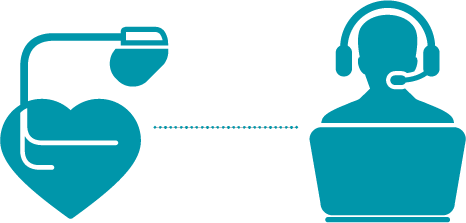
CIED Remote Monitoring Insights:
ScottCare Spotlight with James Pettit CRAT
One of the aspects of Ambucor that make it unique are the people behind the remote monitoring and reporting. The success of the service relies on the dedicated specialists who spend their days helping clinics and patients maintain cardiovascular health. We spoke with James Pettit, CRAT about remote cardiac monitoring and Ambucor.
Could you describe for me the remote CIED monitoring services that you provide for clinic and physician accounts that you manage?
Ambucor provides ambulatory monitoring services for patients with implanted cardiac devices, including implantable loop recorders, pacemakers, and defibrillators. We work with the largest manufacturers of implantable devices, which allows our team to monitor people with CIED devices throughout the country. Specifically, I am responsible for performing routine and alert checks on patient data and reporting this information. These reports include any arrhythmias the patient may have had, whether their device performed the correct functions if needed, changes in a patient’s cardiac health status, and the current functioning of the device. If any of these arrhythmias, device functions, patient health or device status meet certain criteria, Ambucor alerts the patient’s healthcare team so they may take the appropriate action to assist in the patient’s care. Our routine reports include any of the aforementioned data during a specific time period, so the healthcare team is kept aware of how the patient and device are doing.
What do you see as the biggest pain points that you resolve?
Pain points are usually the result of something that goes wrong and results in an outcome that is not optimal. When it comes to patient care, we have to work effectively and efficiently with the healthcare professionals connected to each of the patients. Providing alert notifications can resolve significant pain points for our patient population, because remote monitoring can allow us to find information relevant to a patient’s device or health before it becomes a larger issue. An additional pain point I have found is simply the result of miscommunication. I try to reduce this by being direct about relevant patient information, but also empathetic to the individual receiving the information. Every person involved in a patient’s care has something else going on, and pain points can be either created or resolved through understanding.
Clinics that work with you are very happy. In your experience, what makes a good CIED technician?
Although that is great to hear, I do not have nearly as much experience as my colleagues in the department and would not want to assume that I could describe a “good” CIED technician. I can say this – a good CIED department is what we offer at Ambucor. We operate as a team and this makes us both efficient and effective. Our CIED department is made up of several other departments that operate as a whole, and each contributes to a successful outcome. For example, if someone is out of the office, another team member will step up and help to make sure that that person’s alerts for the day are taken care of properly. I could think of many more examples, but that is one that comes to mind. It is an essential part of our commitment to healthcare and to each other. I believe this commitment is why, if you asked other physicians and clinics we work with about my colleagues, you would get the same positive feedback.
Do you have any tips to offer to a clinic that might help in the management of their CIED program? Whether it is workflow, additional info to consider, etc?
I would not want to offer tips to a clinic on how to manage their CIED program. However, this question does bring up an important part of what Ambucor does. We offer each clinic with whom we work the services to integrate with their preferred workflow. Most clinics want a feeling of autonomy and we would not want to interfere with the way in which they are operating. This makes sense when considering our role is two-fold – first is optimal healthcare for cardiac patients, and second is handling patient data to give our clinics the time to perform other important duties. Disrupting their operation could create unnecessary complexity.
The only recommendation I might make is one that I have always found helpful – find a good “point” person or group of people who work for the clinic and establish a good rapport with them. This point person/persons should know how their clinic operates, who to contact with different questions, and help facilitate a workflow that is beneficial for everyone involved.
What do you think is the most valuable benefit of working with Ambucor?
Pardon me for being presumptuous, but I would think that from a provider perspective, our most valuable benefit is patient care. I mentioned before that we have multiple teams who contribute to our CIED department. We have a front end team who helps with enrolling patients, and more importantly, contacting them for better patient compliance. We have a triage team who adjudicates alerts to make sure they are handled in a timely manner. We have a reporting team who creates the reports with relevant information and sends alerts as we receive them. We have a management team who coordinates with every other department to make sure all work gets done in an efficient and effective manner. All of these departments and colleagues who work in them contribute to an optimal patient care outcome. This is the most valuable benefit to our clinics and customers.
To learn more about Ambucor Remote Patient Monitoring Services, visit our web page.


